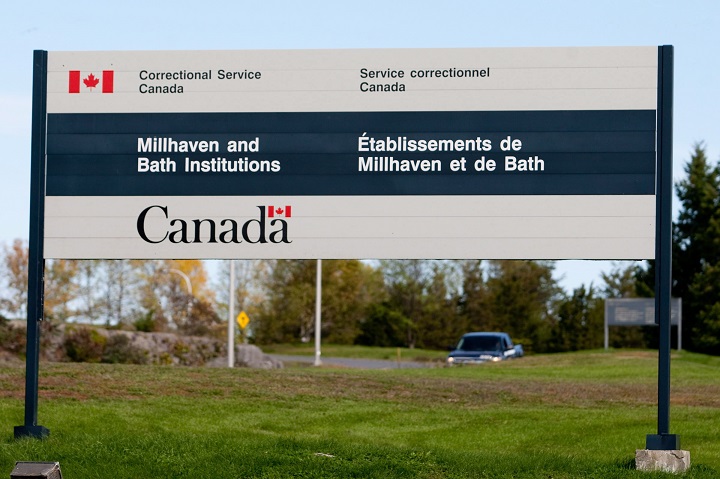BATH, Ont. – A ringleader of the so-called Toronto 18 terror cell has no “viable” plan to resist the radical influences that once led him to plot a deadly attack against Parliament, officials said Wednesday in denying him parole.

While Fahim Ahmad has gained important insight into what drew him to embrace violent extremism in his late teens, he isn’t prepared to deal with the stressors that contributed to his radicalization, a two-member panel of the Parole Board of Canada said.
The panel raised concerns over how Ahmad would handle exposure to the Internet and his eventual return to a mosque, both environments he admitted fuelled his extremist beliefs in the past.
Reuniting with his family – particularly his now ex-wife – could also add to the strain, they said.
The fact that Ahmad, 30, brushed off suggestions he could re-offend only raised red flags, the panel said.
“You said that you weren’t over-confident – I think you are,” said Louise Harris, the lead board member. “I’m not sure you won’t be coming back into a similar situation.”
Even before the board members reached their decision, Ahmad told them he didn’t expect to be released until his sentence expires in 2018.
His parole officer acknowledged there are few resources in the correctional system to prepare “these types of offenders” for reintegration and that his access to an imam had dwindled due to cutbacks.
- Life in the forest: How Stanley Park’s longest resident survived a changing landscape
- ‘Love at first sight’: Snow leopard at Toronto Zoo pregnant for 1st time
- Carbon rebate labelling in bank deposits fuelling confusion, minister says
- Buzz kill? Gen Z less interested in coffee than older Canadians, survey shows
Ahmad also had several “security incidents” in prison, though there is no indication he tried to recruit other inmates, Erin Brown said.
The Toronto 18 plotted to blow up the Parliament buildings, kill the prime minister and take MPs hostage. They were rounded up in the summer of 2006 in an anti-terrorist operation that made headlines around the world.
Ahmad pleaded guilty in the middle of his 2010 trial to participating in a terrorist group, importing firearms and instructing his co-accused to carry out an activity for a terrorist group.
He was sentenced to 16 years in prison but received a credit of 8 1/2 years for the more than four years he spent in custody awaiting trial.
He served 3 1/2 years in segregation in a Quebec facility for the most violent offenders before being transferred to the maximum-security Millhaven Institution in Bath, Ont., where Wednesday’s parole hearing was held.
Over more than two hours, Ahmad laid out how he grew to espouse “violent extremism” in the wake of 9/11.
The growing public distrust of Muslims sparked Ahmad’s interest in his own faith, he said, noting he’d previously only gone to the mosque for religious holidays.
Soon he was spending 10 to 12 hours a day there talking with other zealous youths, and getting sucked into online discussions that merged religion and politics, he said.
“Most of it happened on the Internet,” he said. “It was just mostly manifested there (at the mosque).”
He met his wife in one such chat room. They were married by the time he was 18 and had their first child, a girl, within two years, he said.
The pressure of fatherhood, financial strain and his wife’s post-partum depression pushed him to spend less and less time at home, he said. The mosque “was an escape for me” and she felt it, he said.
The couple argued often, he said. They divorced sometime after his arrest.
Ahmad said he fell prey to the “fantasy” and glamour of extremism at a time when he struggled with his responsibilities. He partly blamed others in the Muslim community, who he said misled him as to the teachings of the Qu’ran.
“I did believe that the highest form of doing something for the religion was through violent jihad,” Ahmad said.
But he repeatedly told the board he had abandoned those beliefs.
“I think based on everything I’ve lost and having seen things for what they really are in a pretty painful way, I can’t see myself going in any direction like that,” he said.
The reported death of one of his colleagues, Mohamed Dirie, served as another “reality check,” he said. Dirie, who pleaded guilty to smuggling weapons for the Toronto 18, was reportedly killed last year while fighting in Syria.
Ahmad suggested he could eventually help keep youth from following in his footsteps, as some appear to be doing in Syria.
“I look at them and I know they’re dying every single day… and no offence, but what a waste,” he said.
When he’s freed, Ahmad said he plans to reconnect with his children and hopes to live in a halfway house, because having to stay with your parents in your 30s is “embarrassing.”
The judge who oversaw the Toronto 18 trial four years ago said he believed Ahmad had a chance at rehabilitation.
The group’s other ringleader, Zakaria Amara, was sentenced in 2010 to life in prison with no chance of parole until 2016.
He and Ahmad had a falling out and Amara formed a separate group in 2006, which managed to get further along in its plans to bomb the Toronto Stock Exchange, CSIS offices in Toronto and an eastern Ontario military base.
Of the 18 people charged, seven had their charges dropped or stayed, four were found guilty and seven pleaded guilty.

Comments